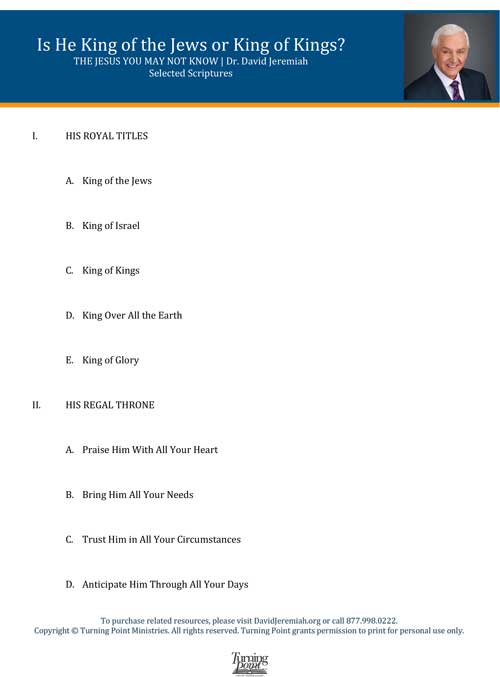The Jesus You May Not Know
Learn toFathomJesus like never before
Resources from David Jeremiah to aid in your journey from knowing about Jesus to knowing Jesus.
Is He King of the Jews or King of Kings?
Thanks for downloading your free resource!
Thanks for downloading your free resource!

The Authorized Biography of Jesus Christ
By David Jeremiah
I’ve had many mentors in life, but most of them had departed this life when they taught me their greatest lessons. They’ve lined the walls of my study and filled my bookcases with their words of wisdom. Like many of our Turning Points readers, I enjoy good books and have profited immeasurably from biography. Many times my thoughts have been changed, my habits improved, my courage restored, and my direction clarified by a timely paragraph in the story of some great man or woman, living or dead. As you may have noticed, lots of these timeless antidotes show up in my sermons and writings.
To me, reading a good biography is like entertaining a great soul in my home. He or she may live in a different age, speak a different language, and face a different set of challenges; but when I open their stories, I’m sitting down with them for a pleasant visit. They speak to me as if near at hand. And the fellowship is amazingly compressed. I can cover decades of their lives in a few pleasant hours. In the process, I learn about a world not my own, and I live in times that expand my experiences.
Louis Fischer said, “Biography is history seen through the prism of a person.”1 By reading biography, I can tramp through the jungle with David Livingstone, eavesdrop on Churchill and Roosevelt as they confer during World War II, don the pinstripes with Mickey Mantle, pace the floors of the White House with Abraham Lincoln, and tremble with excitement as Bonhoeffer confronts Hitler.
A truly well–written biography is a rare treat, but the best biographies are found in God’s Book.
The Bible is filled with great and unvarnished stories of individual history. Think of the men and women we encounter between Genesis and Revelation. When we get to heaven, we’ll already know Abraham, David, Peter, and Paul. Some of us have studied their lives for years and meeting them will be like greeting an old friend. Think of the Heroes of the Faith described in Hebrews 11—men and women “of whom the world was not worthy” (Hebrews 11:38). Their lives should inspire us to “lay aside every weight, and the sin which so easily ensnares us, and… run with endurance the race that is set before us, looking unto Jesus” (Hebrews 12:1–2).
An Intimate Look at His Earthly Life
It’s “looking unto Jesus” that I really want to talk about. In an unmistakable sense, the entire Bible is the authorized biography of Jesus Christ. He’s the Seed of the woman in Genesis, the Passover Lamb of Exodus, the Burnt Offering of Leviticus, the Smitten Rock of Numbers, the Prophet–like–unto–Moses in Deuteronomy, the Captain of the Lord’s army in Joshua, the Kinsman Redeemer in Ruth, the Fourth Man in the furnace in Daniel, and the Suffering Servant in Isaiah. The shadow of Jesus falls over every page of the Bible from the first hint of His coming in Genesis 3:15 to His glorious return and eternal reign in Revelation 22.
It’s in the Gospels, however, that we meet Him face–to–face and study His earthly life from conception to ascension. In reading Matthew, Mark, Luke, and John, we’re able to kneel with the Magi in Bethlehem’s stable, join Christ for His baptism in the Jordan, hike with Him through Galilee, hear His teachings on the mountainside, watch Him debate in the temple courts, and join Him on that “hill far away.” These scenes become so ingrained in our minds it’s as if they’re part of our own biographies.
As we study the story of Jesus, there’s one thing we know for certain: He perfectly fulfilled the will of God. He said, “I have come—in the volume of the Book it is written of Me—to do Your will, O God” (Hebrews 10:7). In the Garden of Gethsemane, He prayed, “Not My will, but Yours, be done” (Luke 22:42). His every moment was a continuous personification of God’s perfect will.
An Exposé of His Motives
With that in mind, we can be certain that God’s will—His all–encompassing plan for us—includes three glorious elements: Rejoice always. Pray without ceasing. In everything give thanks.
“This is the will of God in Christ Jesus for you,” Paul added.
Notice he didn’t merely say, “For this is the will of God for you.” He included that powerful New Testament prepositional phrase—“in Christ Jesus.” This was Paul’s signature phrase for describing the Christian life. When we receive Jesus Christ as Savior and Lord, we are “in Christ.”
Just as Jesus perfectly fulfilled His Father’s will in the realm of His own personality, He now does so through you and me by His Holy Spirit.
When we rejoice, it’s Jesus rejoicing through us. When we pray, it’s our Lord Jesus Christ prompting and empowering our prayers. When we give thanks, we’re reflecting His own emotions.
It makes sense, then, to notice how He did these things in the Gospels.
For example, the four Gospels talk about “joy” and “rejoicing” more than forty times. We have no problem visualizing Jesus as a man of joy. His birth brought a message of “good tidings of great joy” (Luke 2:10). His ministry filled His followers with joy (John 3:29). He rejoiced that the lost sheep was found, and He encouraged His followers to rejoice that their names were written in heaven (Matthew 18:13; Luke10:20). He rejoiced when people received His message (Luke 10:21). His first command on Resurrection Sunday was, “Rejoice!” (Matthew 28:9).
“These things I have spoken to you,” He said in John 15:11, “that My joy may remain in you, and that your joy may be full.”
Rejoice always! It’s not a matter of trying to work up our emotions, but of letting Jesus accomplish His Father’s will through our personalities each day.
This is the will of God in Christ Jesus for you.
An Invitation to Respond
And what about praying without ceasing? Jesus prayed constantly. He wrestled in prayer. He modeled prayer. He rose early to pray. He prayed through the night. He withdrew to the mountains to pray. He retreated to the Garden to pray. He drew down mighty answers to prayer. He taught on prayer. He told us to pray like an insistent neighbor knocking in the night and like an oppressed widow demanding her rights. He told us to pray for those who despitefully use us, to pray in our secret closets, to pray for the Lord of the harvest to send laborers into the work, to pray and fast, to make His temple a house of prayer for all nations, to pray believing, to pray in His name, to pray lest we fall into temptation, and to pray and not lose heart.
And what about giving thanks in all things? Listen to these verses: Jesus answered and said, “I thank You, Father, Lord of heaven and earth….” (Luke 10:21) And He took the seven loaves and the fish and gave thanks… (Matthew 15:36) Then He took the cup, and gave thanks… (Matthew 26:27; Luke 22:17) Then they took the stone away from the place where the dead man was lying. And Jesus lifted up His eyes and said, “Father, I thank You that You have heard Me” (John 11:41).
Earlier I mentioned an observation that biography is looking at history through the prism of a person. In the same way, we can look at the life of Jesus through the prism of 1 Thessalonians 5:16–18. Jesus carried out the will of His Father, demonstrating perfectly what it means to rejoice always, pray without ceasing, and give thanks in all things.
Now He does the same through us, and that’s the significance of the final line in verse 18: “For this is the will of God in Christ Jesus for you.” Our personalities don’t have enough self–contained power to do these things in our own strength. We can’t rejoice always without the joy of Jesus. We can’t pray without ceasing unless the Lord helps us. We can never learn to give thanks in all things unless Jesus’ own perspective is foremost in our thoughts. He is our example and our indwelling secret to knowing and following God’s sure and certain will.
When our own biographies are finished and our stories are told, may those who knew us say, That was a person who rejoiced always, prayed without ceasing, and gave thanks in all things; that was a person who carried out the will of God in Christ Jesus.
1Carl Rollyson, Reading Biography (Lincoln, NE: iUniverse, 2004), 42.
This article is adapted from the March 2013 issue of Turning Points Magazine and Devotional, a ministry of Turning Point with Dr. David Jeremiah. Request your complimentary subscription today.
























